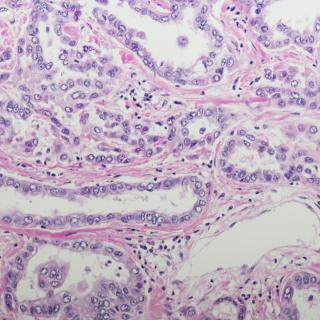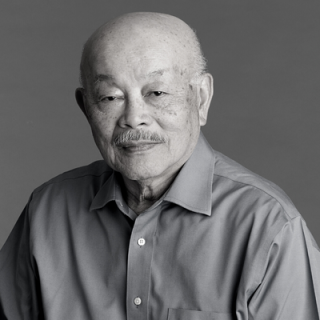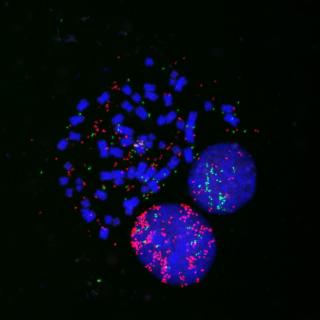News and Events
Celebrating CCR Careers: Alan Rein, Ph.D.
Alan Rein, Ph.D., is a known expert in the field of viral assembly, particularly in retroviruses like the human immunodeficiency virus (HIV). After an extensive career studying molecular mechanisms of retroviral replication and pathogenesis, he has announced his retirement.
Read MoreAligned Blog: Reflecting on Black History Month
Black History Month reminds me to take time to appreciate those who came before me to pave the way for my success and to celebrate all that we as a people have achieved despite the many obstacles placed before us. This month I enlisted some friends and colleagues to share what they love about Black History Month and although it means something slightly different to each of us, we all delight in celebrating our past, present and future!
Read MoreA rare look into what makes mesothelioma aggressive, and potentially treatable
Scientists have a limited understanding of mesothelioma and how to treat it effectively, but that’s beginning to change. In a novel study, CCR researchers identified a 48-gene signature associated with a worse prognosis – but also identified a subset of patients who respond to certain immunotherapy and chemotherapy drugs.
Read MoreHoward A. Young, Ph.D., Elected as 2022 Fellow of the American Association for the Advancement of Science
Howard A. Young, Ph.D., Senior Investigator in the Cancer Innovation Laboratory, has been elected as a 2022 Fellow of the American Association for the Advancement of Science. This honor recognizes fellows for their achievements across disciplines from research, teaching, and technology, to administration in academia, industry and government, to excellence in communicating and interpreting science to the public.
Read MoreIn Memoriam: John J. DiGiovanna
The CCR community is deeply saddened by the passing of John J. DiGiovanna, M.D., Senior Research Physician in the Laboratory of Cancer Biology and Genetics.
Read MoreIn Memoriam: James M. Phang, M.D.
CCR mourns the recent passing of James M. Phang, M.D., former Senior Investigator in the Basic Research Laboratory.
Read MoreExtrachromosomal DNA promotes aggressiveness of small cell lung cancer
Cancers harboring small particles of DNA that exist outside of chromosomes, called extrachromosomal DNA (ecDNA), are associated with aggressive tumor growth, drug resistance, and shorter patient survival. New research shows that ecDNAs in small cell lung cancer contribute to variability between cancer cells, allowing them to rapidly evolve and leading to these undesirable outcomes.
Read MoreFirst clinical trial testing a prevention for breast cancer metastasis to the brain yields encouraging results
When breast cancer metastasizes to the brain, new tumors usually develop even after treatment. But recurrence was low among women who received low-dose temozolomide with T-DM1 in a phase I clinical trial.
Read More4th NCI Symposium on Cancer Health Disparities - Registration Deadline March 28, 2023!
Dates: April 4-5, 2023
Location: Building 35, Rooms 610/620/630/640, NIH
Cancer health disparities affect millions of people across the United States and globally. Disparities in cancer burden are evident by geography, race/ethnicity, genetic ancestry, immigrant status, culture, gender, sexual orientation (LGBTQ+), and socioeconomic class, among other factors. Cancer disparities are not only due to barriers in access to health care, but also due to cultural barriers, structural racism and environmental disadvantage, ancestry-related risk factors, persistent co-morbidities, and chronic stress exposure because of discrimination and social isolation. The challenge of reducing and eliminating health disparities and achieving equity has been largely attributed to the complex interactions among these various determinants.
The symposium will highlight a range of topics to address the systemic barriers and racism that lead to health disparities and showcase ongoing research being done in the social, clinical, epidemiologic, and basic science disciplines. We seek to feature challenges and solutions, and the programs that were developed to address cancer health disparities from researchers in the field and within the intramural NCI program.
Registration is required to attend the symposium.
For conference-related questions, please contact ccrconferences@mail.nih.gov
Read More2023 NCI RNA Biology Symposium - Registration and Abstract Submission Now Open!
Dates: April 27-28, 2023
Location: Building 45, Natcher Auditorium, National Institutes of Health
RNA biology has emerged as one of the most influential areas in modern biology and biomedicine. The discovery of new classes of RNAs and their functions in a wide spectrum of biological processes has revolutionized molecular biology and has profound implications for clinical sciences. Key areas of current research include the elucidation of RNA biogenesis and structure, the identification of functions for various classes of RNAs, establishing the role of RNA in disease and the exploration of RNA-based and RNA-targeted therapies.
The symposium offers the opportunity to learn more about the current status of RNA biology in development and disease and share research with leading figures in the field and discuss the use and implications of these advances for clinical applications.
Registration is free, but is required to attend. There will be no onsite registration.
For conference-related questions, please contact ccrconferences@mail.nih.gov.
Read MoreINSPIRED Symposium - Registration Now Open!
Date: March 1, 2023
Location: Building 45, Natcher Auditorium, National Institutes of Health
INSPIRED: Insights in Pediatric CAR T-cell Immunotherapy: Recent Advances and Future Directions
With the primary goal to bring together the expanding pediatric and young adult CAR T-cell community, in addressing major clinical advances achieved over the last decade and outstanding gaps warranting further focus, we aim to reflect on the 10+ year experience of CAR T-cell delivery to pediatric and young adults with B-cell malignancies. Based on experience gained over this time, this conference will focus on highlighting current best practices, opportunities to address unmet needs, and areas where future research is needed or ongoing. Our primary goal for this conference is to allow for cross-fertilization and collaboration as we strive to improve outcomes using CAR T-cell therapy in pediatric cancers.
Online registration information can be found at: https://go.cancer.gov/I2IUxi0
For conference-related questions, please contact ccrconferences@mail.nih.gov










